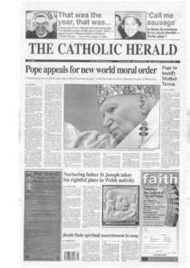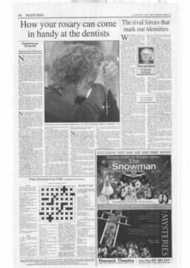Page 7, 3rd January 2003
Page 7

Report an error
Noticed an error on this page?If you've noticed an error in this article please click here to report it.
Tags
Share
Related articles
The Mutations Of A Master Director Taking The
Recapturing The Mystery
Mrs Gaskell Rules Ok
The Triumph Of Psychology Over Grace
Post-christian Spiritual Combat
Counter Culture Leonie Caldecott
The long battle scene at the heart of The Two Towers has been dismissed by a number of critics as appealing mostly to the male psyche. Not an avid watcher of war films at the best of times. I nonetheless have to disagree, as did my older daughters and their friends. Looking at the horrific television schedules for Christmas, whether toting Grand Inquisitors or debunking Our Lady, we felt ourselves to be in a similar impasse to the defenders of the Helm's Deep. As the few hundred-strong remnant of the Rohirrim face 10,000 genetically engineered Super-Ores. programmed by the turncoat wizard Saruman to wipe out "the world of men". your imagination carries to any situation in which evil appears to have the undisputed upper hand. "What can men do in the face of such reckless hate?" Even the supernaturally endowed Legolas is filled with despair at the sight of the ragged excuse for an army which must make its final stand against the powers of darkness.
Yet the king, Theoden, only recently recovered from the poisonous enchantment which has so weakened his kingdom, insists that the remainder of his people will go down fighting. It is his attitude. and that of Aragorn, who declares that he will die alongside the people of Rohan if necessary, that makes for the gripping pathos of the battle preparations. Helping a young boy not yet in his teens prepare. Aragom re-affirms the power of hope. Meanwhile Aragorn's elven counterpart. Arwen, is also proclaiming the possibility of hope in the face of the elves, increasing dissociation from the fate of men. Arwen's role in Tolkien's books was not originally so pivotal. with the womanly. almost Marian role falling rather to her grandmother, Galadriel. The words with which Arwen saves Frodo's life — indeed his very soul — in the first film are interesting in this respect: "What grace is given me, let it pass to him. Let him be spared."
Interwoven into this drama is the quest of Frodo — if the attempt to lose something, rather than find it, can be called a quest. Accompanied by the faithful Sam and then by the pathetic Gollum — an exemplar of the schizophrenic struggle with original sin if ever there was one — this unlikely hero doggedly wends his way towards Mordor and the attempt to destroy the Ring once and for all. Yet as he goes, he is increasingly weighed down by the thing he carries. Gradually he loses the sureness of his direction, succumbing to the dark fascination of the ring and becoming morose and preoccupied. and worse.
This is one of the many areas in which the first two films in the trilogy have differed from Tolkien's original plot. For the sake of economy in this epic story, the films have either left out characters (such as Tom Bombadil) or placed them in slightly different configurations. But the greatest change has been in the ponrayal of the play between shadow and light occasioned by the ring. In the first film Bilbo Baggins, Boromir and even Galadriel herself. are shown being drawn into the ugliness of sin as the ring tempts them, each at his or her own level, And in the second film. the plummeting of Frodo towards the dark seems too swift.
However. I have to say that after seeing the second film, and watching the uncut version of the first one on DVD. I am inclined to give director Peter Jackson and his team the benefit of the doubt. It would have been impossible for the films to approximate the original text scene by scene. The heightened drama of the battle between good and evil that the cinematic adaptation of Tolkien proffers has its reasons (though I still chafe at the portrayal of Galadriel which the shorter version of The Fellowship of the Ring leaves us with).
Noting, in fact, that some of the script developments seemed to be beyond their conscious control (a phenomenon which Tolkien himself described whilst writing the books), Jackson has stated that; "We wanted to be as accurate as possible in putting Tolkien's thematic material into the film." Proof of this is offered by the lifting almost word for word of a crucial speech by Sam on the protagonists in the "tales that really matter". "I expect they had lots of chances, like us, of turning back, only they didn't. And if they had, we shouldn't know, because they'd have been forgotten."
Somehow this statement sums up the significance of Tolkien's epic work, The Lord of the Rings is indeed unforgettable, because it concerns itself with those values that are at the heart of any healthy culture: truthfulness. valour. fellowship, the acceptance of suffering for a higher cause, trust in divine providence. Most markedly Christian than all the rest is the power of the small and apparently weak to defeat those who think only of power for its own sake.
John Wain described the Inklings as a "circle of investigators, almost of incendiaries, meeting to urge one another on in the task of redirecting the whole current of contemporary art and life". And indeed it is as if Tolkien had let off a rocket into the darkening years of the twentieth century, whose purpose — not necessarily in a fully conscious fashion — was to undermine the reign of nihilism just as it would reach its apogee. His harrowing experiences in the first world war speak also to more recent horrors such as Vietnam, Bosnia or 9/11.
As I came out of The Two Towers, I had the sudden certitude that Tolkien was in some measure reaching his mark, with the occasionally clumsy, but largely inspired and inspiring help of this remarkable film. Like the man says: "At dawn, look to the east ..."
blog comments powered by Disqus











